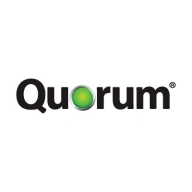

Quorum OnQ and VMware Live Recovery compete in the data recovery and business continuity category. Quorum OnQ seems to have the upper hand due to its efficient recovery processes and user-friendly features.
Features: Quorum OnQ is noted for fast file recovery, automated testing, and ease of virtual machine recovery. VMware Live Recovery excels in scalability, integration with various platforms, and robust disaster recovery options.
Room for Improvement: Quorum OnQ could improve its integration with cloud services, operating system compatibility, and provide a unified interface for disaster recovery management. VMware Live Recovery could benefit from reducing complexity, integrating better with external services, and offering more competitive pricing.
Ease of Deployment and Customer Service: Quorum OnQ is praised for user-friendly deployment and proactive customer support. VMware Live Recovery offers strong support but faces challenges due to the complexity of its deployment process.
Pricing and ROI: Quorum OnQ offers a cost-effective solution with included support and maintenance, providing good value. VMware Live Recovery, while feature-rich, is considered more expensive with higher upfront and ongoing costs.
Our team has dedicated personnel for support who engage with the supporting teams.
They are knowledgeable.
The technical support from VMware is very good and operates based on a service level.
For our test labs, dev labs, and production, it is very stable.
The URL for our environments is the same, making it confusing for management when handling different departments with different needs.
It's important for the cost to be justified based on the features used in production.
I would like to see improved integration services with other solutions, such as SIEM management or security monitoring.
The main issue is to improve the approach of resolving solutions.
It's a little expensive.
Previously, when acquiring a license for Ethiopian drug supply chains, the price was significantly high, especially after Broadcom joined VMware.
We mostly prefer to recommend this to customers due to ease of use, abundant features, and support.
For cloud-based solutions, the cost seems quite pricey, so we stick to on-premises deployment.
Quorum OnQ provides an elevated ability to filter on everything from people's location to age to their voting history.
If I talk about vCenter and the auto failover of the VMs, such as live migration, that is a very cool feature that we require in our environment because we have different data centers, and if some of the servers fail, they automatically failover and move the VM from one side to another.
It is used for data replication between data centers and allows for quick response in times of failure, ensuring data availability.
The capability and the functionality of the features are very helpful for us.
| Product | Market Share (%) |
|---|---|
| VMware Live Recovery | 7.2% |
| Quorum OnQ | 1.4% |
| Other | 91.4% |

| Company Size | Count |
|---|---|
| Small Business | 19 |
| Large Enterprise | 4 |
| Company Size | Count |
|---|---|
| Small Business | 36 |
| Midsize Enterprise | 12 |
| Large Enterprise | 40 |
Quorum onQ is the global leader in 1-click instant recovery, providing full immediate recovery of your critical systems after any storage, system or site failure. It does this by automatically maintaining up-to-date, ready-to-run virtual machine clones of your physical and virtual servers stored on a dedicated appliance – clones that will transparently take over for failed servers within minutes.
We monitor all Disaster Recovery (DR) Software reviews to prevent fraudulent reviews and keep review quality high. We do not post reviews by company employees or direct competitors. We validate each review for authenticity via cross-reference with LinkedIn, and personal follow-up with the reviewer when necessary.